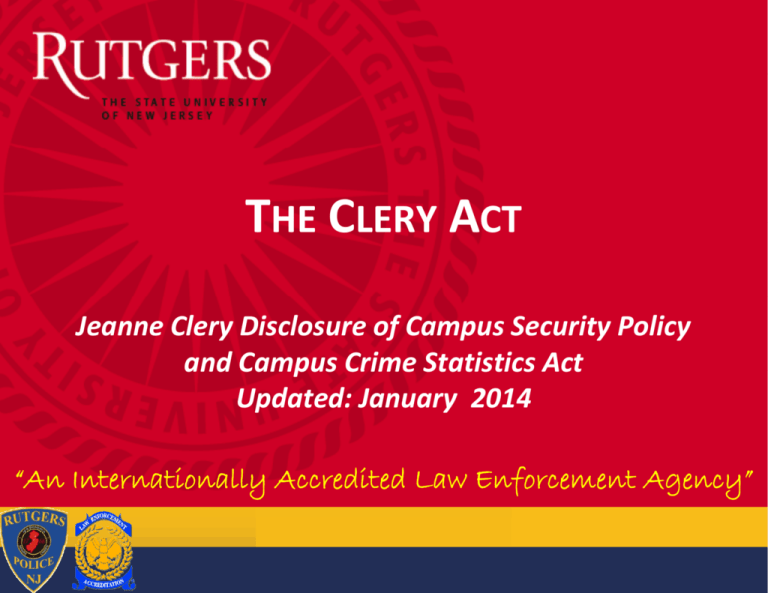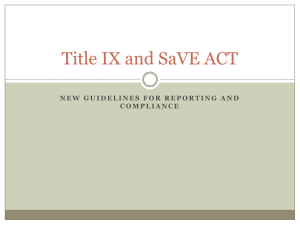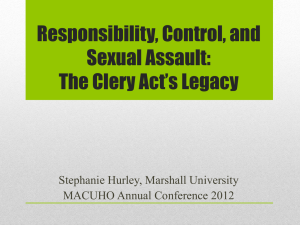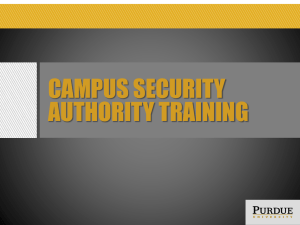the clery act the clery act - RUPD
advertisement

THE CLERY ACT Jeanne Clery Disclosure of Campus Security Policy and Campus Crime Statistics Act Updated: January 2014 “An Internationally Accredited Law Enforcement Agency” TODAY WE WILL DISCUSS… DISCUSS The Clery Act: A Brief History What does it require How does it impact R Rutgers University U i i What are my y responsibilities WHAT IS CLERY? The "Clery Clery Act Act" is named in memory of 19 year old, Lehigh University freshman Jeanne Ann Clery who was raped and murdered while asleep in her residence hall room on April 5, 1986. She was murdered by Josoph Henry, then a 20 year old student who lived off campus and entered Clery Clery’ss dorm through 3 propped doors. doors (Henry was formerly of NJ) November 23, 1966 – April 5, 1986 ABOUT THE ACT… Jeanne's parents, Connie and Howard, discovered that students hadn't been told about: In comparison: 181 previous reports of propped doors. Lehigh had 5,400 400 students with 12 security guards and 38 violent crimes in 3 years prior to her murder. Penn State in the last 3 years had 24 violent crimes with 6 times the student population. p p They joined with other campus crime victims and persuaded Congress to enact this law, which was originally known as the “Crime Awareness and Campus Security Act of 1990.” ABOUT THE ACT… (CONTINUED) The llaw was amended Th d d in i 1992 tto add dd a requirement i t th thatt schools afford the victims of campus sexual assault certain basic rights, and was amended again in 1998 to expand the reporting requirements. The 1998 amendments formally named the law in memory of Jeanne Clery. Clery Subsequent amendments in 2000 and 2008 added provisions dealing with registered sex offender notification and d campus emergency g response, respectively. ti l The 2008 amendments added a provision to protect crime victims, ct s, "whistleblowers", st eb o e s , and a d others ot e s from o retaliation. eta at o JEANNE CLERY DISCLOSURE OF CAMPUS SECURITY POLICY AND CAMPUS CRIME STATISTICS ACT (20 USC § 1092(F)) The landmark federal law requires q colleges g and universities across the US to disclose information about crime i on and d around d their h i campuses. The law is tied to participation in federal student financial aid programs and applies to most institutions of higher education. It iis enforced f db by th the U.S. Department of Education. THE ACT REQUIRES… Emergency notification & evacuation procedures; Timely Warnings; Crime and Fire Logs; Crime Reports from CSAs; Crime Statistics from Local Law Enforcement; Submission of Crime and Fire Statistics to the US DOE; Mi i S Missing Student d N Notification ifi i Procedures; Publish an Annual Security and Fire Safety Report. H w does How d es this impact i pa t YOU? Many crimes, especially sexual assaults, lt are nott reported to police. The Clery Act requires that we gather and publish crime data to ensure that h students d and others know about campus dangers on campus. Data is collected from a wide variety of “Campus Security Authorities”. This where YOU come in FOUR CATEGORIES OF CSA? Campus P C Police. li Non-police security staff responsible f monitoring for it i U University i it property. t People/offices designated under our policy li as th those tto whom/which crimes should be reported. reported Officials with significant responsibility for student and campus activities – That’s you EXAMPLES OF “CSAS”: CSAS : Dean off Students who D S d h oversees student housing, a student t d t center t or student t d t extracurricular activities A director of athletics, a team coach or a faculty advisory to a student group A student resident advisor or assistant or a student who monitors access to dormitories WHO IS NOT CONSIDERED A CSA? Administrative staff not responsible p for students (e.g., payroll, facilities) Individual facultyy who do NOT serve as an advisor to a registered student organization Clerical staff Doctors in the Student Health Center, or Counselors in the Counseling Center Center, who only provide care to individual students. OTHER EXCEPTIONS: Licensed professional mental health counselors and Pastoral counselors (employed by a religious organization to provide confidential counseling) Who are working within ithi th the scope off their license or religious assignment at the time they receive the crime report. report SO YOU YOU’RE RE A CSA – WHAT DO YOU HAVE TO DO? If someone tells you about a crime or an incident that may be a crime, crime you must record the information and submit a report. Just get the facts, the police department will figure out what offense (if any) occurred Wh iin d When doubt, bt reportt it. it WHAT DO YOU HAVE TO REPORT? These crimes must be reported (definitions (d fi i i ffollow): ll ) Criminal homicide Sex offenses, forcible & non-forcible Aggravated assault Robbery Burglary g y Motor vehicle theft Arson WHAT DO YOU HAVE TO REPORT? (CONTINUED) You must also report: Hate crimes, including any of the seven crimes listed above, or any other crime causing bodily injury, if motivated by hate Liquor, drug, and weapons – both arrests AND disciplinary referrals LOCATION, LOCATION, LOCATION A crime must be reported if it occurred: On campus p On public property within or immediately adjacent j to the campus p In or on non-campus buildings or property that Rutgers Owns or controls. See definitions sheet TIMING IS CRITICAL Be sure to document When the crime or incident occurred AND When Wh it was reported t d to t you The law requires that the crime be reported for the calendar year in which it was first fi t reported t d to t a Campus Security Authority – not when it occurred,, not when it was reported to police CONFUSED YET? LOCATIONS NOT INCLUDED: Locations not connected to Rutgers g For Example: A student tells you about a crime that occurred at a different college before he/she transferred to Rutgers; or A student d reports an assault l that h h happened d while hil he/she was away from campus and not involved in a campus activity – e.g., at home on spring break, on vacation, or at a summer job with a private company IN THESE CASES… Please provide the student with reporting options or referral for help: For example: A student tells you that he/she was raped by another student at an off-campus p apartment. p Although the crime did not occur at a location covered by Clery reporting the accused student is reporting, subject to University disciplinary action for this off-campus conduct. I addition, In dditi th the victim i ti iis eligible li ibl ffor victim assistance and resources. WHAT SHOULD YOU DO? Police will categorize the report: your job is to get the information the person is willing to tell you. R Remember: b You don’t have to prove what happened or who was at fault, fault or classify the crime You aren’t supposed to find the p p perpetrator Discuss options: Let the person know about options for reporting to police A person who talks to you may not want to talk to police – and doesn doesn’tt have to. to OTHER AVAILABLE RESOURCES: Victims’ assistance programs for sexual assault and other crimes. Available medical treatment Counseling services for students and staff Information on resources are available by calling University Police. THE QUESTIONS QUESTIONS: Is a violent crime in progress? If so, call police at 9 9-1-1 1 1 or local emergency number immediately! Has the victim sought or is the victim in d off assistance/services? i t / i ? need What happened? How, when, and where did it happen? Is there an identified suspect? Has the incident been reported p to p police or to another CSA? Does the victim wish to remain anonymous? DEFINITIONS: Criminal Homicide: murder, non-negligent manslaughter, manslaughter and negligent manslaughter (including vehicular manslaughter) Aggravated Assault: unlawful attack tt k upon another th with ith intent i t t to inflict severe injury, using weapon or means likely to produce death or great bodily harm DEFINITIONS: (CONTINUED) Sex offenses, forcible and non-forcible Forcible sex offenses: rape, sodomy, sexual fondling, sexual assault with object Non-forcible: statutory rape and incest Questions reference sex offenses: Was crime committed forcibly/against victim’s will? Was victim incapable of giving consent because of temporary/permanent mental/physical incapacity, or because underage? Was assault facilitated by giving drugs/alcohol? DEFINITIONS: (CONTINUED) Robbery: y taking/attempting g/ p g to take somethingg byy force, violence, threat, or by putting victim in fear Questions reference robbery: Was force or a weapon used or threatened? Was W victim i ti iinjured? j d? Did victim feel fearful, threatened or endangered? DEFINITIONS: (CONTINUED) Burglary: unlawful entry into a structure to commit a felony or theft Questions reference burglary: Was item taken from inside dorm room, room office, office store, store lab, or other structure? Was structure,, room,, store,, or office open, p , closed, or locked? How did thief get into the structure/room etc.? t ? DEFINITIONS: (CONTINUED) Motor theft: M t vehicle hi l th ft theft th ft off automobiles, t bil trucks, t k etc., t including “joyriding” (taking by person without lawful access) Arson: willful or malicious burning/attempt to burn structure vehicle, structure, vehicle or personal property of another WHAT IS A HATE CRIME? Anyy of the alreadyy mentioned crimes, or anyy other crime causing bodily injury (e.g. simple assault) where there is evidence of both hate motivation and the victim was selected because of actual/perceived race, ggender,, religion, g , national origin, g , disability, y, or sexual orientation HATE CRIMES TO PROPERTY,, QUESTIONS: Was the target personal property, a personal residence, house of worship, hi or ethnic th i organization? g i ti ? Did the incident involve any expression of hatred (e.g. (e g graffiti, graffiti comments) re: race, gender, ethnicity, religion, sexual orientation, i t ti or di disability? bilit ? Did any personal injury result from the incident? Report any vandalism to property of a religious, ethnic, gay or lesbian organization as a hate crime LIQUOR LIQUOR, DRUGS & WEAPONS Police report statistics on arrests for liquor, drug, and weapons-related p crimes Judicial Affairs reports statistics on disciplinary referrals for drug, drug liquor, liquor and weapon law violations (except when the student was also arrested for the same act) Statistics must reflect number of p persons involved (head count), not just number of incidents CHANGES TO THE CLERY ACT The off Representatives have passed Th Senate S t and d House H R t ti h d an amendment d t to t the Violence Against Women Act (VAWA) which will impact Clery reporting beginning with the 2013 calendar year. These changes are as follows: For Hate Crimes, categories of prejudice (based on actual or perceived race, gender, religion, sexual orientation, ethnicity, or disability) now also includes national origin and gender identity. identity In the category of Hate Crimes, new added Hate Crimes are domestic violence,, datingg violence,, and stalkingg incidents that were reported to Campus Security Authorities or local police agencies. NEW DEFINITION: DATING VIOLENCE The “dating Th term t “d ti g violence” i l ” means violence i l committed by a person— (A) who h iis or h has b been iin a social i l relationship l ti hi off a romantic or intimate nature with the victim; and (B) where the existence of such a relationship shall be determined based on a consideration of the following factors: (i) The length of the relationship. (ii) The type of relationship. (iii) The frequency of interaction between the persons involved in the relationship. NEW DEFINITION: DOMESTIC VIOLENCE The term “domestic domestic violence violence” includes felony or misdemeanor crimes of violence committed by a p of the victim, byy a p person current or former spouse with whom the victim shares a child in common, by a person who is cohabitating with or has cohabitated with the victim as a spouse, spouse by a person similarly situated to a spouse of the victim under the domestic or family violence laws of the jurisdiction receiving grant monies, or by any other person against an adult or youth victim who is protected from that person’s acts under the domestic or family violence laws of the jurisdiction. NEW DEFINITION: STALKING & SEXUAL ASSAULT Stalking: St lki g Engaging in a course of conduct directed at a specific ifi person th thatt would ld cause a reasonable bl person to— (A) fear for his or her safety or the safety of others; or (B) suffer substantial emotional distress Sexual Assault Offense classified as a forcible or nonforcible sex offense under the uniform crime reporting system of the Federal Bureau of Investigation University Policy 30.3.2 Jeanne Clery Disclosure of Campus Security Policy and Campus Crime Statistics Act http://policies.rutgers.edu/3032-currentpdf RESOURCES FOR LEARNING MORE Security On Campus, Inc. N ti National l Association A i ti off College C ll g and d University Attorneys (NACUA) U.S. Department of Education 2011 Handbook for Campus Safety and Security Reporting Accessible at: http://www2.ed.gov/admins/lead/safety/campus.html View Safetyy Matters Online At: http://rupd.rutgers.edu/aboutsafe.shtml Questions? Camden Campus Capt. Richard Dinan (856) 225-6009 dinan201@camden.rutgers.edu Newark Campus Lt. Preston Fletcher (973) 972-7551 pfletche@andromeda.rutgers.edu RBHS at Newark Capt. Alex Rabar (973) 972-7551 rabaras@ca.rutgers.edu New Brunswick Campus Capt. Michael Rein (848) 932-8407 mrein@aps.rutgers.edu







